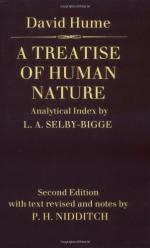
|
| Name: _________________________ | Period: ___________________ |
This quiz consists of 5 multiple choice and 5 short answer questions through Book 1, Part 2, Of The Ideas of Space and Time.
Multiple Choice Questions
1. What does Hume say could be the condition of a man who is insensitive to time?
(a) Dead.
(b) In a coma.
(c) Asleep.
(d) In the middle of a seizure.
2. From where does a human's substantive knowledge come?
(a) Human passion.
(b) Religion.
(c) Society.
(d) Human senses.
3. What fruit does Hume use as an example to show our inability to form a just idea without testing it first?
(a) A banana.
(b) An orange.
(c) A pineapple.
(d) A peach.
4. What does imagination do with simple ideas once it has separated them?
(a) Adds color and light.
(b) Disposes of them.
(c) Puts them in any order it pleases.
(d) Introduces complex ideas.
5. What object does Hume say is sufficient enough to give him the idea of extension?
(a) The chair.
(b) The bath.
(c) The cabinet.
(d) The table.
Short Answer Questions
1. What does Hume say is stronger than imagination?
2. Which French philosopher does Hume reference in this section?
3. What idea does Hume bring in to distinguish between knowledge and probability?
4. What does Hume believe humans generate instead of observing causes?
5. How does Hume define intuition?
|
This section contains 206 words (approx. 1 page at 300 words per page) |

|




